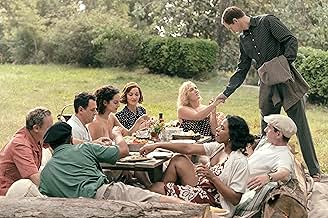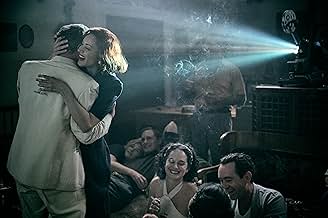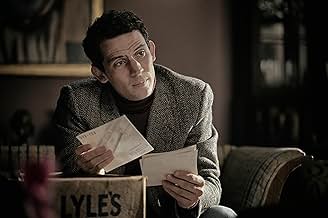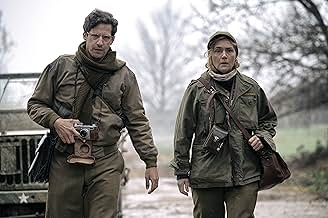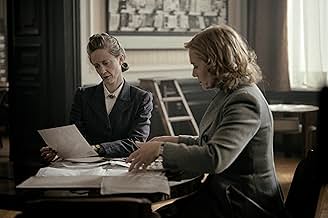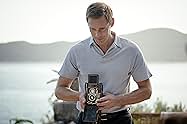La historia de la fotógrafa Elizabeth 'Lee' Miller, una modelo de moda que se convirtió en una aclamada periodista de guerra para la revista Vogue durante la Segunda Guerra Mundial.La historia de la fotógrafa Elizabeth 'Lee' Miller, una modelo de moda que se convirtió en una aclamada periodista de guerra para la revista Vogue durante la Segunda Guerra Mundial.La historia de la fotógrafa Elizabeth 'Lee' Miller, una modelo de moda que se convirtió en una aclamada periodista de guerra para la revista Vogue durante la Segunda Guerra Mundial.
- Dirección
- Guionistas
- Elenco
- Nominada a1 premio BAFTA
- 3 premios ganados y 17 nominaciones en total
Resumen
Reviewers say 'Lee' is a biographical drama about Lee Miller, with Kate Winslet's performance as a standout. Many praise Winslet and the film's depiction of Miller's life. However, some criticize the pacing, script, and direction, finding it slow and lacking emotional depth. The film's handling of historical events receives mixed reactions. The supporting cast is noted, though some feel underutilized. Cinematography and production design are praised, but narrative structure and character development are contentious.
Opiniones destacadas
Greetings again from the darkness. Being courageous and heroic doesn't mean one must wear a cape and possess super powers. In fact, some of the most courageous folks use their words (spoken and written), their feet (for marching into battle), and as we learn here, even their eyes. Lee Miller is a famous photojournalist who used her words to get to the front lines of WWII, her feet to march with soldiers, and her eyes to decide where to focus her camera. The film is based on the biography, "The Lives of Lee Miller", by her son Antony Penrose. It's directed by renowned choreographer Ellen Kuras (her feature film directorial debut) and co-written by Liz Hannah, Marion Hume, John Collee, and Lem Dobbs.
Oscar winner Kate Winslet stars as Lee Miller, and her fierce and committed performance validates what a passion project this was for her, and just how hard she worked to bring the project to fruition. Lee Miller was a well-known fashion model, and we see her hanging out with her band of artistic friends in pre-war France. It's here where she first meets Roland Penrose (Alexander Skarsgard), and their initial intellectual bantering leads right to the bedroom. This after we hear Ms. Miller proclaim that she had ever only been good at drinking, having sex, and taking pictures. She speaks this line in 1977 while being interviewed (by Josh O'Connor, CHALLENGERS, 2024) about her life. It's this interview that provides some structure to the film, while confirming that drinking and smoking were hobbies until the end.
It's really Lee's photographs that guide us through each phase. She and Roland relocate to London during the war, and soon enough she's taking pictures under the guidance of British Vogue editor Audrey Withers (Andrea Riseborough). Continually having to stand up for herself after being rebuked for being a woman doing a man's job, Lee partners with (and ultimately befriends) Life magazine photographer David E Scherman (a surprisingly effective Andy Samberg). Their work documenting history becomes historic in itself. After hearing about the "missing", they were the first journalists to document Dachau concentration camp and the tragic prisoner trains.
Although British Vogue refused to publish the photographs as being too "disturbing", the U. S. magazine did publish, creating awareness of the atrocities. The segment that leads to the infamous photo of Lee bathing in Hitler's tubs is handled expertly. If there is a flaw in the film, it's that we never really get to know Lee's friends, so as she re-connects with Solange (Oscar winner Marion Cotillard), their meeting doesn't hit as hard as it should. Still, the cinematography from Pawel Edelman and the accomplished performance by Kate Winslet, do justice to the stunning (actual) photographs shown. There is a dramatized twist near the film's end that pays homage to Lee and her story. An early comment about Hitler is all too relevant today, and the battle scenes and photographs reinforce what courage Lee Miller exhibited.
Opens in theaters on September 27, 2024.
Oscar winner Kate Winslet stars as Lee Miller, and her fierce and committed performance validates what a passion project this was for her, and just how hard she worked to bring the project to fruition. Lee Miller was a well-known fashion model, and we see her hanging out with her band of artistic friends in pre-war France. It's here where she first meets Roland Penrose (Alexander Skarsgard), and their initial intellectual bantering leads right to the bedroom. This after we hear Ms. Miller proclaim that she had ever only been good at drinking, having sex, and taking pictures. She speaks this line in 1977 while being interviewed (by Josh O'Connor, CHALLENGERS, 2024) about her life. It's this interview that provides some structure to the film, while confirming that drinking and smoking were hobbies until the end.
It's really Lee's photographs that guide us through each phase. She and Roland relocate to London during the war, and soon enough she's taking pictures under the guidance of British Vogue editor Audrey Withers (Andrea Riseborough). Continually having to stand up for herself after being rebuked for being a woman doing a man's job, Lee partners with (and ultimately befriends) Life magazine photographer David E Scherman (a surprisingly effective Andy Samberg). Their work documenting history becomes historic in itself. After hearing about the "missing", they were the first journalists to document Dachau concentration camp and the tragic prisoner trains.
Although British Vogue refused to publish the photographs as being too "disturbing", the U. S. magazine did publish, creating awareness of the atrocities. The segment that leads to the infamous photo of Lee bathing in Hitler's tubs is handled expertly. If there is a flaw in the film, it's that we never really get to know Lee's friends, so as she re-connects with Solange (Oscar winner Marion Cotillard), their meeting doesn't hit as hard as it should. Still, the cinematography from Pawel Edelman and the accomplished performance by Kate Winslet, do justice to the stunning (actual) photographs shown. There is a dramatized twist near the film's end that pays homage to Lee and her story. An early comment about Hitler is all too relevant today, and the battle scenes and photographs reinforce what courage Lee Miller exhibited.
Opens in theaters on September 27, 2024.
Have just got home from watching "LEE" at my local Picture House.
Blimey, that was DARK. Well, it isn't all dark, but by the time you get to the last half hour... oooft. Let's just say that "feelgood" isn't a term anyone's ever going to apply to this one.
It's not like I went in unprepared: I'd seen Kate Winslet doing the promotional chat show appearances, and as I am already a great admirer of Lee Miller's photojournalism, I knew the kind of subject matter we'd inevitably be exploring, but still... don't say you haven't been warned. This film presents you with you the hideous fact of Nazi genocide, very convincingly as the revelation it must have been in the moment, without (thankfully) a scrap of sentimentality.
Winslet is magnificent in the title role - as is everyone else, to be honest: there are no shoddy performances to be found - and, speaking as a Rolleiflex TLR user myself, it was clear that she had done her homework viz how to wield that lovely machine convincingly. There were moments when the nit-picky photography pedant in me did query whether some of the interior photos were being taken in such low light that it was unlikely to have left any usable impression on the relatively slow film stock available in the 1940s, but let's not quibble!
It's quite a long movie and events are presented in a simple, linear fashion (via a series of chronological flashbacks) with rather uniform pacing throughout - personally, I would have preferred a bit more variation in pace; your taste may differ.
My only really negative criticism has to do with one, frankly bizarre, piece of casting. The role of Englishman Roland Penrose is given to Swedish star Alexander Skarsgård - whose plucky attempt at an English accent is ...I think "variable" is the kindest word for it. It was hard to tell what part of England he was supposed to be from, or indeed what social class, and there were several moments when he didn't sound any kind of English at all. I had to suspend my disbelief on some pretty strong elastic whenever he opened his mouth. Ah well... go figure!
Blimey, that was DARK. Well, it isn't all dark, but by the time you get to the last half hour... oooft. Let's just say that "feelgood" isn't a term anyone's ever going to apply to this one.
It's not like I went in unprepared: I'd seen Kate Winslet doing the promotional chat show appearances, and as I am already a great admirer of Lee Miller's photojournalism, I knew the kind of subject matter we'd inevitably be exploring, but still... don't say you haven't been warned. This film presents you with you the hideous fact of Nazi genocide, very convincingly as the revelation it must have been in the moment, without (thankfully) a scrap of sentimentality.
Winslet is magnificent in the title role - as is everyone else, to be honest: there are no shoddy performances to be found - and, speaking as a Rolleiflex TLR user myself, it was clear that she had done her homework viz how to wield that lovely machine convincingly. There were moments when the nit-picky photography pedant in me did query whether some of the interior photos were being taken in such low light that it was unlikely to have left any usable impression on the relatively slow film stock available in the 1940s, but let's not quibble!
It's quite a long movie and events are presented in a simple, linear fashion (via a series of chronological flashbacks) with rather uniform pacing throughout - personally, I would have preferred a bit more variation in pace; your taste may differ.
My only really negative criticism has to do with one, frankly bizarre, piece of casting. The role of Englishman Roland Penrose is given to Swedish star Alexander Skarsgård - whose plucky attempt at an English accent is ...I think "variable" is the kindest word for it. It was hard to tell what part of England he was supposed to be from, or indeed what social class, and there were several moments when he didn't sound any kind of English at all. I had to suspend my disbelief on some pretty strong elastic whenever he opened his mouth. Ah well... go figure!
We were lucky to catch a preview of "Lee" tonight and what a film it is.
This biopic about Lee Miller is not only a powerful look at her incredible life but also a strong reminder of the horrors of war. As both a groundbreaking photographer and war correspondent, the film captures the devastating things she witnessed and the emotional toll they took on her.
The storytelling is gripping and moving, offering a deep look into resilience, art, and humanity in the face of such atrocities. I highly recommend checking it out when it comes out in Australia later this month - it's a film that will stay with you.
This biopic about Lee Miller is not only a powerful look at her incredible life but also a strong reminder of the horrors of war. As both a groundbreaking photographer and war correspondent, the film captures the devastating things she witnessed and the emotional toll they took on her.
The storytelling is gripping and moving, offering a deep look into resilience, art, and humanity in the face of such atrocities. I highly recommend checking it out when it comes out in Australia later this month - it's a film that will stay with you.
I've seen a few review that seem quite dismissive about the scope and importance of Lee. But if you know about the limited freedom of women during this time period you will totally appreciate the audacity and productivity delivered here. Lee was spurned on by personal trauma to do good with her hard fought freedom to operate in a man's world.
Lee has all the period clothing and historical accuracy which is no small feat, while showing the sheer determination it took to achieve access to the final Nazi front of WW2. People back home in the US didn't believe exactly the horrors and certainly not the numbers of the Holocaust. It was the undeniable courageous journey by Lee which brought back the unmistakeable proof and witness of an evil place in history
Knowing that one can't unsee certain such things in person gives one empathy for the cost of doing photo journalism. Many get martyred while doing their work when jailed or taken hostage in authoritarian regimes. But in this case, to have survived seems as permanently affecting a way to finish such an important task.
Lee has all the period clothing and historical accuracy which is no small feat, while showing the sheer determination it took to achieve access to the final Nazi front of WW2. People back home in the US didn't believe exactly the horrors and certainly not the numbers of the Holocaust. It was the undeniable courageous journey by Lee which brought back the unmistakeable proof and witness of an evil place in history
Knowing that one can't unsee certain such things in person gives one empathy for the cost of doing photo journalism. Many get martyred while doing their work when jailed or taken hostage in authoritarian regimes. But in this case, to have survived seems as permanently affecting a way to finish such an important task.
You have got to admire Kate Winslet for her determination to make a film about Lee Miller, the pioneering photographer who was one of the first to see the nazi death camps and who fought for her right to record history as she saw it, and as a woman. Winslet campaigned for years and was consistently turned down but she did finally achieve her aim, and the resulting film is a pretty good, sometimes very good. Winslet as Lee Miller is excellent, and although initially the film meanders through millers career in the early stages of the war, later, as she gets more involved, it's a much better film, often impressive and insightful and even powerful. Miller is someone worth commemorating, and this is a fine tribute.
¿Sabías que…?
- TriviaBased on "The Lives of Lee Miller," the only authorized biography of Lee Miller's life, written by her own son, Anthony Penrose, and published in 1985.
- ErroresArinze Kene who plays Major Jonesy is an African American in charge of white troops in 1944. African American soldiers did not see combat until later that year and African American officers would not have been in charge of white troops until after the desegregation of the armed forces in 1948.
- Citas
Lee Miller: [Handing a knife to a girl she has just saved from rape] Next time, cut it off.
- Créditos curiososThe closing credits have some "what happened to" explanations ; and some of Lee's original photos, often alongside the ones which were recreated for the film.
- ConexionesFeatured in The 7PM Project: Episode dated 21 October 2024 (2024)
Selecciones populares
Inicia sesión para calificar y agrega a la lista de videos para obtener recomendaciones personalizadas
- How long is Lee?Con tecnología de Alexa
Detalles
- Fecha de lanzamiento
- Países de origen
- Sitio oficial
- Idiomas
- También se conoce como
- Лі
- Locaciones de filmación
- Productoras
- Ver más créditos de la compañía en IMDbPro
Taquilla
- Total en EE. UU. y Canadá
- USD 2,005,488
- Fin de semana de estreno en EE. UU. y Canadá
- USD 713,255
- 29 sep 2024
- Total a nivel mundial
- USD 24,612,473
- Tiempo de ejecución1 hora 57 minutos
- Color
- Mezcla de sonido
- Relación de aspecto
- 1.85 : 1
Contribuir a esta página
Sugiere una edición o agrega el contenido que falta

Principales brechas de datos
What is the Canadian French language plot outline for Lee (2023)?
Responda






